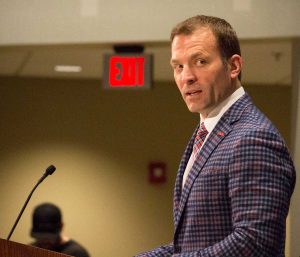Ole Miss Athletics has taken a financial blow over the past couple of years, according to Director of Athletics Ross Bjork.
The Athletic Department comes No. 24 nationally in revenue and has an annual budget of $117 million, which has almost doubled in the past five years. Despite the increases, there’s one area that Ole Miss has taken a loss in.

Ross Bjork explains his grievances with the NCAA and COI rulings in 2017. File photo by Billy Schuerman
The “reserve fund,” as Bjork calls it, is down from where it was a few years ago.
“Through that success in our financial picture, we’ve been able to build that ‘reserve fund’ up to about $27 million,” Bjork said on the Oxford Exxon podcast Monday afternoon. “With the bowl ban the last two years, that’s about a $16 million hit. We’ve had some other revenue losses with ticket sales, sponsorships and other donations.”
The two-year bowl ban that registered a $16 million hit to the original $27 million fund certainly hurts, but Bjork hopes that money will be back soon now that the university no longer has a postseason ban to worry about.
“Weathering that storm, we’ve got to pull that money out of our reserves,” Bjork said. “So, at the end of this fiscal year, we’ll be at around $8 million in reserves.”
That loss can be attributed to many things — the two-year bowl ban, donation shortages, loss of sponsorships. However, there’s one thing Ole Miss is really hurting for: ticket sales.
As Bjork said, ticket sales are down as of last year, and that directly impacts the department’s pockets.
“We need to build that back up through fundraising and ticket sales,” Bjork said. “Last year we were at about 47,000 season tickets in football. We need to get that back in the (50,000) range.”
That’s in stark contrast with the 54,000 season tickets sold in 2017. Those numbers mean that more than 7,000 people canceled their Ole Miss football season tickets in just one calendar year, which is an alarming rate for the athletic department if it continues.
“(Improving ticket sales) helps continue the financial health,” Bjork said. “I would say we’ve had our challenges, but we have a good plan. We need to sell the program. Obviously, we know winning helps.”
Winning helps, but Ole Miss hasn’t done a lot of that in the past three seasons, which is likely why ticket sales are down so drastically.
Although Bjork sounded concerned about season ticket sales, he mentioned another way to generate revenue for the “reserve fund” that appears to be more lucrative and productive for the university in the long run.
“It comes down to fundraising,” Bjork said. “There’s no limit on fundraising. We have a ton of proposals out there now that could, in many ways, be transformational for our program.”
It’s unclear what those proposals are, but Bjork seemed confident in their potential.
Although Ole Miss Athletics’ total budget and revenue is up over the past five years, losing nearly $20 million of the athletic department’s “reserve fund,” along with declining season ticket sales doesn’t reflect well on the university, or Bjork.
“We have not cut sports budgets. We have not cut back,” Bjork said. “We wanted to make sure we operate at a high-SEC level.”






